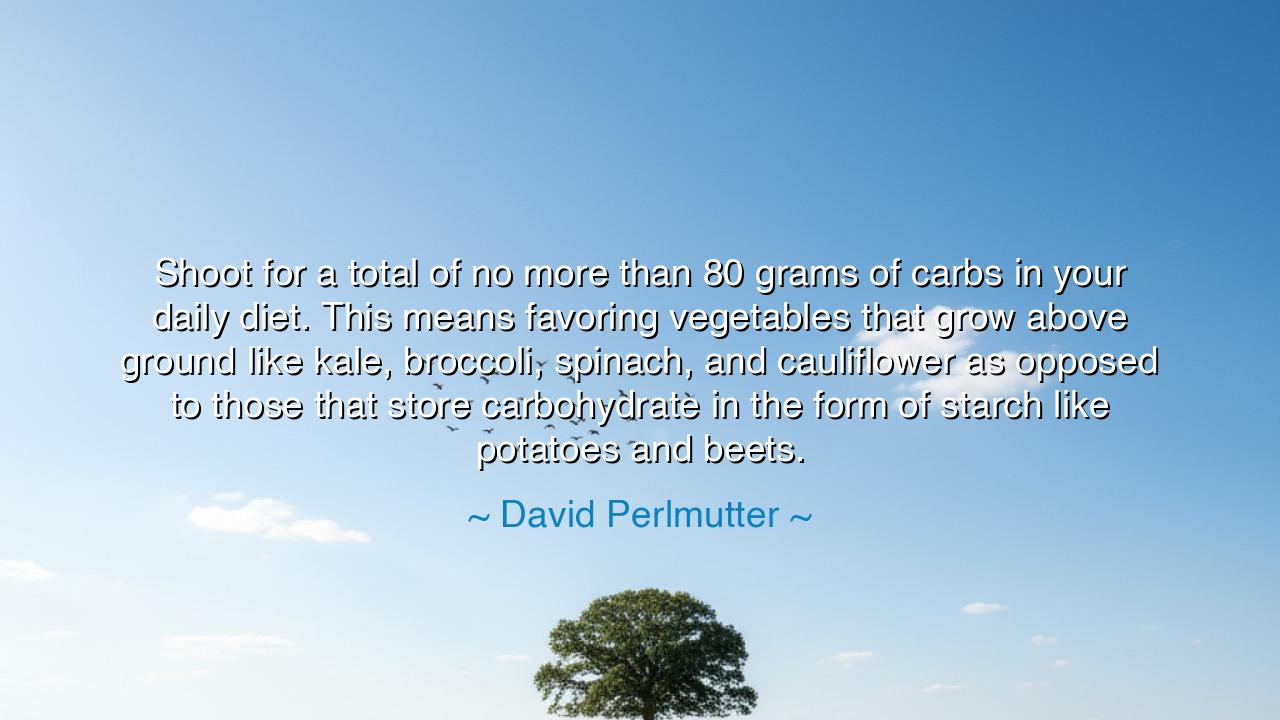
Shoot for a total of no more than 80 grams of carbs in your daily
Shoot for a total of no more than 80 grams of carbs in your daily diet. This means favoring vegetables that grow above ground like kale, broccoli, spinach, and cauliflower as opposed to those that store carbohydrate in the form of starch like potatoes and beets.






In the ancient tradition of wisdom, it was often said that the body is a temple, a sacred vessel that must be treated with care, reverence, and balance. David Perlmutter, in his words about the role of carbohydrates in our diet, speaks to this age-old truth: "Shoot for a total of no more than 80 grams of carbs in your daily diet. This means favoring vegetables that grow above ground like kale, broccoli, spinach, and cauliflower as opposed to those that store carbohydrate in the form of starch like potatoes and beets." In this advice, Perlmutter echoes an ancient wisdom that teaches us to nourish the body with what it needs, and to avoid overindulgence in what may harm or unbalance it.
The great healers and philosophers of the ancient world understood that balance was the cornerstone of health. Hippocrates, the father of modern medicine, famously said, "Let food be thy medicine and medicine be thy food." But what is this medicine he speaks of? It is not the excesses of indulgence, but the careful and mindful selection of foods that nourish the body without overwhelming it. The ancient Greeks, with their deep understanding of the body’s needs, knew that too much of any one thing—be it food, drink, or even rest—could lead to imbalance. Perlmutter’s advice to limit carbohydrates and choose vegetables wisely is a modern reflection of this ancient teaching—choosing foods that nourish and heal, rather than those that overload or harm.
Look to the great Romans for further wisdom. Cicero, the philosopher, believed that the health of the body and mind could not be separated. To him, the food one consumed was a reflection of the discipline one maintained in life. The Romans practiced moderation and self-control in their diet, focusing on simplicity and balance rather than indulgence. They recognized that the body required the right fuel to maintain its strength and clarity. The teachings of Cicero and his contemporaries mirror Perlmutter’s advice, encouraging us to seek nourishment through foods that are light, pure, and free from excess. Like the Romans, we must embrace discipline in our choices, favoring the vegetables that nourish and restore without burdening our system.
Consider the great warrior Hercules, who faced trials and labors that required both physical strength and mental clarity. While he was known for his heroic deeds, his success lay not only in his might but in his commitment to maintaining his health. The ancient texts suggest that Hercules followed a strict regimen of diet and exercise to keep his body in peak condition, choosing foods that were simple, sustaining, and in balance with his strength. In a way, Perlmutter’s advice can be seen as a modern reflection of Hercules’ disciplined approach to his diet—choosing foods that fuel the body without burdening it with excess, ensuring that strength and clarity are maintained.
The ancient practice of yoga in India offers yet another example of balance and self-awareness in the realm of nutrition. The yogis of old understood that the body and mind are inextricably linked, and that the food one consumes affects not only physical health but spiritual well-being. Ayurveda, the ancient system of medicine, teaches that the body thrives on a balanced diet—one that is tailored to the individual’s constitution and life path. Like Perlmutter, the ancient yogis advocated for a diet that favored vegetables, grains, and fruits that are light, easily digestible, and nourishing to the soul. The emphasis was never on excess, but on harmony—ensuring that what we put into our bodies fosters clarity, peace, and vitality.
In all of these ancient teachings, the wisdom is clear: the body requires balance and discipline to thrive. Perlmutter’s insight into carbohydrates is but a modern reflection of an age-old truth—that we must choose our food wisely, favoring that which nourishes us and avoids the excesses that overwhelm our systems. Just as the Greeks, Romans, and yogis of old understood that the food we consume is the foundation of health, so too must we recognize that the modern diet should reflect these principles. Perlmutter’s guidance invites us to return to the simplicity of nourishing, clean foods—those that come from the earth, rich in nutrients and light in their impact on the body.
The lesson here is profound: to achieve health and vitality, we must embrace a balanced approach to our diet—one that honors both the body’s needs and its limitations. Perlmutter’s advice is not a call to deprivation, but to discipline and awareness. Like the ancients, we must be mindful of our choices, choosing foods that provide us with the strength we need without burdening us with excess. Let us seek a path of moderation, favoring vegetables and simple, nourishing foods while avoiding the heavy, starchy indulgences that can weigh us down.
In your own life, consider the wisdom of the ancients and Perlmutter’s words. Reflect on the foods that nourish you, that provide strength, clarity, and balance, and make them the foundation of your diet. Let go of excess and indulge only in moderation, understanding that true vitality comes not from indulgence, but from the simple, disciplined choices we make every day. As the ancients have taught, let food be not just sustenance but the medicine that nourishes both body and soul.






AAdministratorAdministrator
Welcome, honored guests. Please leave a comment, we will respond soon